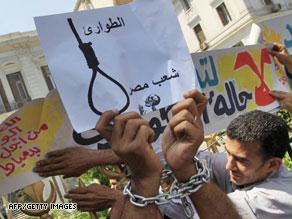 CAIRO: Blatant discrepancies between appearance and reality are the stuff of tragedy. And what happened at the Egyptian People’s Assembly last week is nothing short of tragic.
CAIRO: Blatant discrepancies between appearance and reality are the stuff of tragedy. And what happened at the Egyptian People’s Assembly last week is nothing short of tragic.
Last Tuesday, the renewal of the state of emergency for another two years until May 31, 2012 did not come about without introductions.
The unusual Labor Day speech by President Hosni Mubarak sent clear signals of impending doom to any individual, group or organization daring to challenge the absolute powers of the current regime.
Those who try to “mix reform ideas with chaos,” said the convalescing 82-year-old Egyptian President, must know that “raising slogans is not enough to attract voters” and that these groups need to outline their policies with regards to attracting foreign investors, creating job opportunities, increasing wages, fighting terrorism and foreign relations.
The underlying assumption then is that the current regime has actually put in place successful policies with regards to all five strategic issues and hence poses as the best possible option for Egyptian voters —a statement based on the double fallacy that the ruling National Democratic Party clique is successful (claims that some 25 percent of the population live under the poverty line, are just plain lies) and that Egyptians actually do vote in free and fair elections.
Less than a week after a speech that was unanimously perceived as a direct threat to voices of dissent, 308 out of 454 members of our illustrious People’s Assembly voted in support of renewing the state of emergency for another two years in approval of a presidential decree to that effect, with 103 members voting against and 43 votes strangely unaccounted for.
Apart from the irony that the majority of the house that represents “the people” has voted overwhelmingly to perpetuate the enforcement of a law that tramples “the people’s” civil liberties with impunity, there is the other matter of how this time around (after almost 30 years of living under a state of emergency), the government pretended that newly introduced amendments to the notorious law will actually make any real difference on the ground.
Pledging only to apply the controversial law, which gives police unfettered powers of arrest and suspends constitutional rights, to cases of terrorism and narcotics, Prime Minister Ahmed Nazif tried to sell a false picture of the decades old law.
According to rights groups, the “new version” will do little to protect constitutional safeguards concerning house searches and monitoring of communications that are suspended under the current law, which also empowers the president to transfer ordinary crimes for trial in exceptional Emergency State Security Courts, which rights groups say lack the basic guarantees of a fair trial.
In theory, security forces will no longer be able to exercise powers to censor broadcasts or order the closure of publishing houses. They will also be denied the right to use powers conferred on them under this law to confiscate property, regulate the hours of operation of commercial activities and isolate and evacuate certain areas.
However, in practice, according to an article published by Daily News Egypt, a Human Rights Watch statement points out that while the power to monitor communications may no longer be available to security forces under the emergency law, the “2007 amendments to Article 179 of the constitution already gave [the government] the power to monitor communications outside of the emergency law and without judicial warrant in terrorism-designated cases.”
Attempting to sell these cosmetic amendments as a “transitional step towards lifting the state of emergency and adopting a counter terrorism law,” as the government described it, is no more than an over-used publicity stunt from a regime that has lost all credibility. There is little hope that police will respect these new amendments. What would stop them from labeling anyone a terror suspect and implementing the so-called amended law randomly against the opposition?
And despite the deluge of criticism from international rights groups, the US government and the EU, the Egyptian authorities were unfazed. Foreign Minister Ahmed Aboul Gheit promptly dismissed the US criticism as "overly politicized" and audaciously claiming that their stance reflects an ignorance of the "real situation" in Egypt and addressed an audience of Western media and rights groups.
Exactly what Aboul Gheit meant by the “real situation” in Egypt, continues to be a mystery, which takes us back to the notion of appearance versus reality.
While the government (and repeatedly the president) continues to laud Egypt’s stability and its rising status as an emerging market to attract foreign investments, it is still compelled to uphold a state of emergency under the pretext of fighting terrorism and drug trafficking, which the current penal code is perfectly capable of combating.
With two milestone legislative elections taking place in the coming months and critical presidential elections next year, the renewal of emergency law this time around, though expected, will have far-ranging consequences. This renewed blow to any hope for serious political reform once again proves that the single-party, authoritarian rule in Egypt is here to stay.
There is no political will on the part of the government to meaningfully change the status quo from the core; and with the lack of a strong, unified opposition, peaceful change is certainly not imminent.
--------------------------------
The daily news
--------------------------------
The daily news



